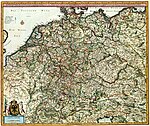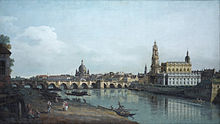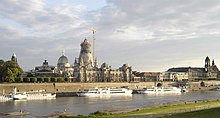Timeline of Dresden
Timeline of the history of Dresden, Saxony, Germany
The following is a timeline of the history of the city of Dresden, Saxony, Germany.
Prior to 18th century
Part of a series on the | ||||||||||
|---|---|---|---|---|---|---|---|---|---|---|
| History of Germany | ||||||||||
 | ||||||||||
| Early history | ||||||||||
| ||||||||||
| ||||||||||
| ||||||||||
|

- 1206 – First documentation of Dražďany.[1]
- 1215 – Nikolaikirche founded.
- 1272 – Franziskanerkloster founded.
- 1309 – City seal incorporates coat of arms of Dresden.
- 1350 – first documentation of Altendresden (today Innere Neustadt) at the northern side of the Elbe.
- 1351 – Sophienkirche built.
- 1388 – Kreuzkirche consecrated.
- 1400 – Busmannkapelle built.
- 1409 – Armory established.
- 1434 – Striezelmarkt occurring.
- 1524 - Printing press in operation.[2]
- 1530 – City expands.
- 1548 – Orchestra founded.
- 1563 – Dresdner Zeughaus [de] built.[3]
- 1589 – Johanneum built.[3]
- 1666 – Premiere of Schütz's St Matthew Passion.[4]
- 1667 – Opera house opens.[4]
- 1678 - "Elector of Saxony's Players" dramatic troupe(de) headquartered in Dresden (approximate date).[5]
- 1695 – Parade of Frederick Augustus I.[6][7]
- 1697 – Population: 40,000 (approximate).[8]
- 1700 – Von Tschirnhaus glassworks set up.[9]
18th century

- 1704 - Palais Flemming-Sulkowski built.
- 1708 – Porcelain developed by Johann Friedrich Böttger.[9]
- 1710 – Meissen porcelain manufactory begins operating near city.[10]
- 1717 – Japanisches Palais built.[3]
- 1718 – Royal Palace rebuilt.[3]
- 1719 – Wedding reception of Polish Prince Frederick Augustus and Maria Josepha of Austria.
- 1720 – Catholic Cemetery opens by decree of King Augustus II the Strong.[11]
- 1722
- Zwinger built.[3][10]
- Picture Gallery founded.[3]
- 1723
- Grünes Gewölbe founded.
- Pillnitz Castle built.
- 1724 – Royal Cabinet of Mathematical and Physical Instruments established.
- 1726 – Übigau Palace completed.[12]
- 1729 – Wackerbarth-Palais built.
- 1733 – Villages of Gorbitz and Übigau (present-day districts) granted to Aleksander Józef Sułkowski by Augustus III of Poland.[12]
- 1736 – Equestrian sculpture of Polish King August the Strong unveiled.
- 1743 – Frauenkirche built.[8]
- 1745 - City "taken by the Russians."[13]
- 1748 – Collegium Medico Chirurgicum established.
- 1755 – Population: 63,000 (approximate).[8]
- 1756 – Catholic Church of the Royal Court built.[8]
- 1759 - September: "Dresden liberated from Prussians."[14]
- 1760 – July: Siege of Dresden.[14][15]
- 1763 – Death and burial of King Augustus III of Poland at the Catholic Church of the Royal Court.
- 1764 – Dresden Art Academy founded.
- 1776 – Landhaus built.
- 1784 – Observatory established.
- 1788 – Saxon Library opens.
- 1793 – Tadeusz Kościuszko begins preparations for the Kościuszko Uprising in the city in response to the Second Partition of Poland.[16]
19th century

- 1807 – Constitution of the Duchy of Warsaw promulgated.
- 1809 – Austrians in power.[15]
- 1813 – 26–27 August: Battle of Dresden.[13][17]
- 1814 – Großer Garten opens to the public.
- 1818 – Ernst Arnold gallery established.[18]
- 1823 – Jordan & Timaeus chocolate manufactury established.[9]
- 1828 – Saxon Technical School founded.
- 1831 – Many Polish insurgents of the November Uprising fled from the Russian Partition of Poland to the city.[1]
- 1833 – Isis Society (natural history) founded.[19]
- 1835 – Polish composer Fryderyk Chopin met his future fiancée Maria Wodzinska in the city.[20]
- 1838 - Dresden Coinage Convention held in city.[21]
- 1839 – Leipzig–Dresden railway begins operating.
- 1843 - Jam factory begins operating.[22]
- 1845 – Flood.
- 1841 – Opera house built.
- 1845 - 19 October: Premiere of Wagner's opera Tannhäuser.[23]
- 1849 – May Uprising in Dresden.[17]
- 1852
- Marien Brucke (bridge) constructed.[24]
- Population: 100,000.
- 1854 – Semper Gallery[3] and Schloss Albrechtsberg built.
- 1855 – September: Royal Gallery opens.[25]
- 1856 – Dresden Conservatory established.[23]
- 1858 - Population: 128,152.[26]
- 1861 – Dresden Zoo opens.[27]
- 1866 – Prussians in power.[15]
- 1870 – Gewerbehausorchester founded.[28]
- 1871 – Military facility built in Albertstadt.[citation needed]
- 1874 - Dresden English Football Club confirmed
- 1875 – Dresden Museum of Ethnology founded.
- 1876 – Fürstenzug created.
- 1878 – Opera house rebuilt.
- 1889
- Albertinum built.[3]
- Dresden Botanical Garden created.
- 1891 – Dresden City Museum founded.
- 1893 – Blue Wonder bridge constructed.
- 1895 – Dresden Funicular Railway begins operating.
- 1897 – Dresden Central Station built.
- 1898
- Ernemann-Werke [de] camera factory in operation.
- Dresdner SC football club formed.
20th century
1900-1945

- 1901
- Dresden-Neustadt station opens.
- Schwebebahn Dresden begins operating.
- 1903
- German City Exhibit held.[29]
- Simmel delivers The Metropolis and Mental Life lecture.[30]
- 1904 – Ministry building constructed.
- 1905 - 9 December: Premiere of Strauss' opera Salome.
- 1910
- Städtische Zentralbibliothek, Dresden [de] (city library) formed.[31]
- Augustus Bridge constructed.
- 1911
- Dresden Museums Association formed.
- Premiere of Strauss' opera Der Rosenkavalier.[32]
- 1912 – Ihagee camera company and German Hygiene Museum founded.
- 1914 – Saxon army museum established.
- 1919
- Stadion am Ostragehege des Dresdner SC opens.
- Population: 529,326.[33]
- 1923 – Glücksgas Stadium built.
- 1932 – Polish-language church services cancelled.[1]
- 1933 – Population: 649,252.
- 1935 – Dresden-Klotzsche Airport opens.

- 1939
- September: Mass arrests of local Polish activists (see also Nazi crimes against the Polish nation).[34]
- Population: 625,174.[15]
- 1940 – Hans Nieland becomes mayor.
- 1942
- June: Subcamp of the Flossenbürg concentration camp founded at the SS Engineer's Barracks.[35]
- 23–24 August: Twelve young Polish men, members of the Czarny Legion resistance organization, executed.[36]
- 24 August: Five Polish students of the Salesian oratory in Poznań, known as the "Poznań Five" (Poznańska Piątka), later beatified martyrs of World War II of the Catholic Church, executed.[37]
- 1944
- 15 September: Subcamp of the Flossenbürg concentration camp founded at the Railway Repair Works. Its prisoners were mostly Poles and Russians.[38]
- 9 October: Two women subcamps of Flossenbürg founded at the Goehle-Werk and Universelle factories. Its prisoners were mostly Poles, Russians and Germans.[39][40]
- 22 October: Dresden-Reick subcamp of Flossenbürg founded. Its prisoners were mostly Polish, Russian and Jewish women.[41]
- 24 November: Dresden-Bernsdorf subcamp of Flossenbürg founded. Its prisoners were mostly Polish-Jewish men, women and children.[42]
- 1945
- 13–14 February: Aerial bombing by Allied forces.[43]
- 19 February: Subcamp of Flossenbürg at the Railway Repair Works dissolved. Prisoners deported to the main Flossenbürg camp.[38]
- 24 March: Dresden-Reichsbahn subcamp of Flossenbürg founded. Its prisoners were mostly Polish, Jewish and Russian men.[44]
- April: Goehle-Werk, Bernsdorf, Reichsbahn, Universelle and SS Engineer's Barracks subcamps of Flossenbürg dissolved. Prisoners either deported or mostly sent on death marches to various other locations.[35][39][40][42][44]
- 22–27 April: Battle of Dresden
- April: Reick subcamp of Flossenbürg dissolved. Prisoners sent on a death march to the Ore Mountains.[41]
- 8 May: Russians take city.[15]
1946-1990s
- 1946
- Sächsische Zeitung begins publication.
- Population: 450,000.
- 1950
- SG Deutsche Volkspolizei Dresden football club founded.
- Botanical Garden restored.
- Hellerau and Pillnitz incorporated into city.
- 1956 – Dresden Transport Museum opens.
- 1959 – Galerie Neue Meister formed.
- 1960 – Józef Ignacy Kraszewski Museum opens at his former house.
- 1961 – Dresden University of Technology formed.
- 1972 – Filmtheater Prager Strasse [de] opens.[45]
- 1973 – Dresden S-Bahn established.
- 1983
- Staatsschauspiel Dresden formed.
- Population: 522,532.
- 1986 - Pinova apple created.[46]
- 1989
- protests stop the planned high-purity silicon factory[47]
- trains with East German embassy refugees from Prague pass Dresden main station with demonstrations and clashes with the police[48][circular reference]
- Monday demonstrations
- 1990 - Dresdner Neueste Nachrichten begins publication.
- 1991
- Bunte Republik Neustadt festival begins.
- Fußballverein Dresden-Nord formed.
- 1992
- Soviet forces withdrawn.
- Helmholtz-Zentrum Dresden-Rossendorf established.
- 1996 – Dresdner Sinfoniker [de] founded.
- 2000 - Stadtarchiv Dresden [de] (city archives) relocated to Elisabeth-Boer-Strasse.[49]
21st century



- 2002
- Elbe Flood.[50]
- Volkswagen's Transparent Factory opens.
- 2004
- Dresden High Magnetic Field Laboratory established.
- Dresden Elbe Valley designated an UNESCO World Heritage Site.
- 2005
- Dresden Frauenkirche rebuilt.
- Dresden City Art Gallery opens.
- Neo-Nazi demonstration.
- 2006 – 800th anniversary of founding of Dresden.
- 2007
- Freiberger Arena opens.
- Waldschlösschen Bridge construction begins.
- 2008
- Helma Orosz becomes mayor.[51]
- December: City hosts the 38th Chess Olympiad.
- 2009 - Dresden Elbe Valley's UNESCO World Heritage Site status is revoked.
- 2010 – Anti-fascist demonstration.
- 2011
- Bundeswehr Military History Museum opens.
- Population: 523,058.[52]
- 2013
- Elbe flood.
- September: City co-hosts the 2013 Women's European Volleyball Championship.
- 2014 - PEGIDA begin protesting(de) against Islamism in the city, drawing crowds estimated up to 17,000 in peak[53][54]
- 2015 - Dirk Hilbert becomes mayor.
See also
- History of Dresden [de]
- Economy of Dresden
- List of mayors of Dresden [de]
Other cities in the state of Saxony:
References
- ^ a b c Leksykon Polactwa w Niemczech (in Polish). Opole: Związek Polaków w Niemczech. 1939. pp. 169–170.
- ^ Henri Bouchot (1890). "Topographical index of the principal towns where early printing presses were established". In H. Grevel (ed.). The book: its printers, illustrators, and binders, from Gutenberg to the present time. London: H. Grevel & Co.
- ^ a b c d e f g h Kunstsammlungen 1897.
- ^ a b Stephen Rose (2005). "Chronology". In Tim Carter and John Butt (ed.). Cambridge History of Seventeenth-Century Music. Cambridge University Press. ISBN 978-0-521-79273-8.
- ^ William Grange (2006). "Chronology". Historical Dictionary of German Theater. Scarecrow Press. ISBN 978-0-8108-6489-4.
- ^ "Procession through the streets of Dresden held by Friedrich August I (Dresden: 1695)". Treasures in Full: Renaissance Festival Books. British Library. Retrieved 30 August 2014.
- ^ Tony Sharp (2001). Pleasure and Ambition: The Life, Loves and Wars of Augustus the Strong. I.B.Tauris. p. 101. ISBN 978-1-86064-619-5.
- ^ a b c d Brewster 1830.
- ^ a b c City of Dresden. "History of the City". Retrieved 26 July 2012.
- ^ a b "Central Europe (including Germany), 1600–1800 A.D.: Key Events". Heilbrunn Timeline of Art History. New York: Metropolitan Museum of Art. Retrieved 30 September 2015.
- ^ "Innerer Katholischer Friedhof". February 2023.
- ^ a b Perłakowski, Adam (2013). Kariera i upadek królewskiego faworyta. Aleksander Józef Sułkowski w latach 1695–1738 (in Polish). Kraków: Towarzystwo Wydawnicze Historia Iagellonica. pp. 187–188. ISBN 978-83-62261-58-1.
- ^ a b Overall 1870.
- ^ a b Franz A.J. Szabo (2013). "Chronology of Major Events". The Seven Years War in Europe: 1756-1763. Routledge. ISBN 978-1-317-88697-6.
- ^ a b c d e Webster's Geographical Dictionary, Springfield, Massachusetts: G. & C. Merriam Co., 1960, OCLC 3832886, OL 5812502M
- ^ "Insurekcja Kościuszkowska - ostatnia próba ratowania Rzeczpospolitej". Dzieje.pl (in Polish). Retrieved 13 August 2022.
- ^ a b Ernest F. Henderson (1937). "Chronological Table: 1658-1914". A Short History of Germany. New York: Macmillan. hdl:2027/uc1.b3851058 – via HathiTrust.
- ^ W. Pembroke Fetridge (1874), "Dresden", Harper's Hand-Book for Travellers in Europe and the East, New York: Harper & Brothers
- ^ Phillips 2003.
- ^ Plenzler, Anna (2012). Śladami Fryderyka Chopina po Wielkopolsce (in Polish). Poznań: Wielkopolska Organizacja Turystyczna. p. 5. ISBN 978-83-61454-99-1.
- ^ Glyn Davies; Roy Davies (2002). "Comparative Chronology of Money" – via University of Exeter.
- ^ Ursula Heinzelmann (2008). "Timeline". Food Culture in Germany. Greenwood Press. ISBN 978-0-313-34495-4.
- ^ a b Claude Egerton Lowe (1896). "Chronological Summary of the Chief Events in the History of Music". Chronological Cyclopædia of Musicians and Musical Events. London: Weekes & Co. pp. 87–110.
- ^ "New Railway and Traffic Bridge at Dresden, Saxony". Gleason's Pictorial. Boston. 14 August 1852.
- ^ A. J. Dupays (September 1857). "Royal Gallery of Dresden". The Crayon. 4. NY. JSTOR 25527622.
- ^ Georg Friedrich Kolb (1862). "Deutschland: Sachsen". Grundriss der Statistik der Völkerzustands- und Staatenkunde (in German). Leipzig: A. Förstnersche Buchhandlung.
- ^ Vernon N. Kisling, ed. (2000). "Zoological Gardens of Germany (chronological list)". Zoo and Aquarium History. US: CRC Press. ISBN 978-1-4200-3924-5.
- ^ Colin Lawson, ed. (2003). "Orchestras Founded in the 19th Century (chronological list)". Cambridge Companion to the Orchestra. Cambridge University Press. ISBN 978-0-521-00132-8.
- ^ Andrew Lees; Lynn Hollen Lees (2007). Cities and the Making of Modern Europe, 1750–1914. Cambridge University Press. ISBN 978-0-521-83936-5.
- ^ Jan Lin; Christopher Mele, eds. (2013). Urban Sociology Reader (2nd ed.). Routledge. ISBN 978-1-136-24414-8.
- ^ Über uns: Chronik (in German), Städtische Bibliotheken Dresden, retrieved 30 September 2015
- ^ "Timeline of opera", Oxford Music Online, Oxford University Press, retrieved 30 March 2015
- ^ "Germany: Principal Towns". Statesman's Year-Book. London: Macmillan and Co. 1921. hdl:2027/njp.32101072368440 – via HathiTrust.
- ^ Cygański, Mirosław (1984). "Hitlerowskie prześladowania przywódców i aktywu Związków Polaków w Niemczech w latach 1939–1945". Przegląd Zachodni (in Polish) (4): 54.
- ^ a b "Dresden (SS Engineer's Barracks) Subcamp". KZ-Gedenkstätte Flossenbürg. Retrieved 13 August 2022.
- ^ Sack, Birgit (2015). "Plac Monachijski w Dreźnie i jego znaczenie w kontaktach gostyńsko-drezdeńskich". Rocznik Gostyński (in Polish). No. 2. Gostyń: Muzeum w Gostyniu. p. 97. ISSN 2353-7310.
- ^ "80. rocznica męczeńskiej śmierci "Poznańskiej Piątki"". Instytut Pamięci Narodowej (in Polish). Retrieved 11 December 2023.
- ^ a b "Dresden (Railway Repair Works) Subcamp". KZ-Gedenkstätte Flossenbürg. Retrieved 13 August 2022.
- ^ a b "Dresden (Goehle-Werk) Subcamp". KZ-Gedenkstätte Flossenbürg. Retrieved 13 August 2022.
- ^ a b "Dresden (Universelle) Subcamp". KZ-Gedenkstätte Flossenbürg. Retrieved 13 August 2022.
- ^ a b "Dresden-Reick Subcamp". KZ-Gedenkstätte Flossenbürg. Retrieved 13 August 2022.
- ^ a b "Dresden (Bernsdorf) Subcamp". KZ-Gedenkstätte Flossenbürg. Retrieved 13 August 2022.
- ^ Tami Davis Biddle (2005). "Sifting Dresden's Ashes". Wilson Quarterly. 29 (2): 60–80. JSTOR 40260966.
- ^ a b "Dresden (Reichsbahn) Subcamp". KZ-Gedenkstätte Flossenbürg. Retrieved 13 August 2022.
- ^ "Movie Theaters in Dresden, Germany". CinemaTreasures.org. Los Angeles: Cinema Treasures LLC. Retrieved 27 July 2013.
- ^ Rowan Jacobsen (2014). Apples of Uncommon Character. Bloomsbury Publishing. ISBN 978-1-63286-035-4.
- ^ "Dresden 1989: Siliziumwerk wird zur Kraftprobe zwischen Bürger und Staat". 25 September 2011.
- ^ de:Flüchtlingszüge aus Prag
- ^ Stadtarchiv Dresden: Schätze aus acht Jahrhunderten (PDF) (in German), Landeshauptstadt Dresden, 2010
- ^ "Germany Profile: Timeline". BBC News. 13 March 2012. Retrieved 15 November 2013.
- ^ "German mayors". City Mayors.com. London: City Mayors Foundation. Retrieved 27 July 2013.
- ^ "Population of Capital Cities and Cities of 100,000 or More Inhabitants". Demographic Yearbook 2011. United Nations Statistics Division. 2012.
- ^ Dearden, Lizzie (23 December 2014). "Germany anti-Islam protests: 17,000 march on Dresden against 'Islamification of the West'". The Independent. Archived from the original on 2022-05-07.
- ^ Thousands Rally at German Protest Against Refugees, Islam, 12 October 2015
{{citation}}: Unknown parameter|agency=ignored (help)
This article incorporates information from the German Wikipedia.
Bibliography
in English
- John Russell (1828), "Dresden", A Tour in Germany, and Some of the Southern Provinces of the Austrian Empire, in 1820, 1821, 1822, Edinburgh: Constable, OCLC 614379840
- David Brewster, ed. (1830). "Dresden". Edinburgh Encyclopædia. Edinburgh: William Blackwood.
- Mariana Starke (1839), "Dresden", Travels in Europe (9th ed.), Paris: A. and W. Galignani
- William Henry Overall, ed. (1870). "Dresden, Saxony". Dictionary of Chronology. London: William Tegg. hdl:2027/uc2.ark:/13960/t9m32q949.
- "Dresden", Northern Germany (5th ed.), Coblenz: Karl Baedeker, 1873, OCLC 5947482
- Guide to Dresden, its Buildings, Institutions and Environs, Dresden: Herman Burdach, 1880, OCLC 2838150, OL 24467281M
- Guide to the Royal Collections of Dresden, translated by Fox, C.S., Dresden: Staatliche Kunstsammlungen Dresden, 1897, OL 7082856M
- Mary Endell (1908), Dresden: History, Stage, Gallery, Dresden: J. Seifert, OCLC 373304, OL 6638502M
- "Dresden", Northern Germany as Far as the Bavarian and Austrian Frontiers (15th ed.), Leipzig: Karl Baedeker, 1910, OCLC 78390379
- G. E. Collier (1910), Collier's New Practical Guide to Dresden, Dresden: A. Tittmann, OL 13523819M
- Dresden. Grieben's Guide Books. Berlin. 1910.
{{cite book}}: CS1 maint: location missing publisher (link) - Nathaniel Newnham Davis (1911), "Dresden", The Gourmet's Guide to Europe (3rd ed.), London: Grant Richards
- Denise Phillips (2003). "Friends of Nature: Urban Sociability and Regional Natural History in Dresden, 1800–1850". Osiris. 18: 43–59. doi:10.1086/649376. JSTOR 3655284. S2CID 145497167.
- Susanne Vees-Gulani (2008). "The politics of new beginnings: the continued exclusion of the Nazi past in Dresden's cityscape". In Gavriel David Rosenfeld; Paul B. Jaskot (eds.). Beyond Berlin: Twelve German Cities Confront the Nazi Past. US: University of Michigan Press. ISBN 978-0-472-11611-9 – via HathiTrust. (fulltext)
in German
- "Dresden". Topographia Germaniae (in German). Vol. Topographia Superioris Saxoniae, Thüringiae, Misniae et Lusatiae. Frankfurt. 1650. p. 43+. c. 1650/1690
- "Dresden". Brockhaus' Konversations-Lexikon (in German) (14th ed.). Leipzig: Brockhaus. 1908. pp. 428–439.
- P. Krauss und E. Uetrecht, ed. (1913). "Dresden". Meyers Deutscher Städteatlas [Meyer's Atlas of German Cities] (in German). Leipzig: Bibliographisches Institut.
- Wolfgang Adam; Siegrid Westphal, eds. (2012). "Dresden". Handbuch kultureller Zentren der Frühen Neuzeit: Städte und Residenzen im alten deutschen Sprachraum (in German). De Gruyter. pp. 417+. ISBN 978-3-11-029555-9.
External links

Wikimedia Commons has media related to History of Dresden.
- Links to fulltext city directories for Dresden via Wikisource
- Europeana. Items related to Dresden, various dates.
51°02′00″N 13°44′00″E / 51.033333°N 13.733333°E / 51.033333; 13.733333













